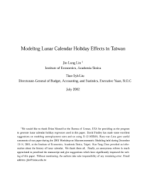
An official website of the United States government
Here’s how you know
Official websites use .gov
A .gov website belongs to an official government organization in the United States.
Secure .gov websites use HTTPS
A lock (
) or https:// means you’ve safely connected to the .gov website. Share sensitive information only on official, secure websites.
-
//
- Census.gov /
- Library /
- Census Working Papers /
- Modeling Lunar Calendar Holiday Effects in Taiwan
Modeling Lunar Calendar Holiday Effects in Taiwan
Modeling Lunar Calendar Holiday Effects in Taiwan
Abstract
The three most important Chinese holidays, Chinese New Year, the Dragon-boat Festival, and Mid-Autumn Holiday have dates determined by a lunar calendar and move between two solar months. Consumption, production, and other economic behavior in countries with large Chinese population including Taiwan are strongly affected by these holidays. For example, production accelerates be-fore lunar new year, almost completely stops during the holidays and gradually rises to an average level after the holidays. This moving holiday often creates difficulty for empirical modeling using monthly data and this paper employs an approach that uses regressors for each holiday to distin-guish effects before, during and after holiday. Assuming that the holiday effect is the same for each day of the interval over which the regressor is nonzero in a given year, the value of the regressor in a given month is the proportion of this interval that falls in the month. Bell and Hillmer (1983) proposed such a regressor for Easter which is now extensively used in the U.S. and Europe. We apply the Bell and Hillmer’s method to analyze ten important series in Taiwan, which might be af-fected by moving holidays. AICC and out-of-sample forecast performance were used for selecting number of holiday regressors and their interval lengths. The results are further checked by various diagnostic checking statistics including outlier detection and sliding spans analysis. The empirical results support this approach. Adding holiday regressors can effectively control the impact of mov-ing holidays and improves the seasonal decomposition. AICC and accumulated forecast error are useful in regressor selection. We find that unemployment rates in Taiwan have holiday effects and seasonal factors cannot be consistently estimated unless the holiday factor is included. Further-more, as the unemployment is rising, the magnitude of holiday and seasonal factor are decreasing. Finally, we find that holiday factors are generally smaller than seasonal factors but should not be ignored.
Others in Series
Working Paper
Working Paper
Working Paper
Share
Related Information
Some content on this site is available in several different electronic formats. Some of the files may require a plug-in or additional software to view.
 Yes
Yes
 No
NoComments or suggestions?


Top

